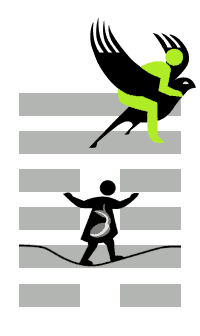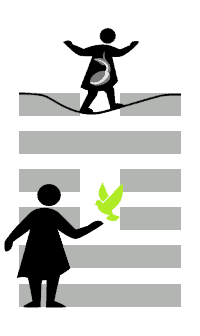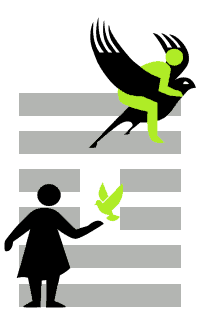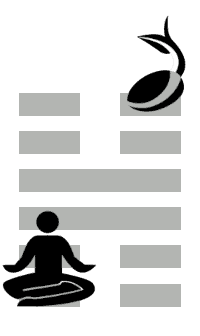Breathe in. Breathe out. Breathe in again… Only in connection with my environment am I viable. I cannot exist in complete isolation, I depend on exchange. Breathing. Acting.
Weiterlesen: 58 – the joyous59 – dispersion
Case Study
A user asks the I Ching about her business constellation which has served her well for a long time. Recently, however, she felt that it was time for a change as she wanted to focus on a different target group in the future. The I Ching answers with hexagram 59 – dispersion. The title, dispersion, confuses her: does it mean that she should liquidate her old business and then to start all over again in a new constellation?
Weiterlesen: 59 – dispersion60 – limitation
Questions on Hexagram 60
- The user’s question is: “What is there to say about the city / area where I live?” The user has lived in this place for a long time, but always with a feeling of alienation, discomfort, like a prisoner. He feels grateful – but at the same time burdened, bored.
The answer of the I Ching is: 60 – limitation. Somehow he likes the modern interpretation Debris turns Humus. A similar phrase has been with him for a long time, a phrase that speaks of flowers that need a certain kind of soil/dung to grow. - The user’s question: “What is important now, in this existentially threatening situation?” The background, he explains, is that new projects are developing that give him justified hope. He feels that he should nurture hope and at the same time take the chaos (in the form of his living environment) more easily. There is a lot to sort out, and this mountain of work together with old fears almost paralyzes him. But at the same time he feels hope, a light that gives him courage and says: All is well.
- A user asks how he should behave in the upcoming collaboration. He actually feels superior to his partner because of his greater experience and would like to set the pace. On the other hand, it is clear that his partner will manage and coordinate the entire project.
- A user asks: “When will Max the dachshund return to his owner? Will he ever come back?”
- One user writes: “I’ve started a new job and find myself increasingly overwhelmed by the demands of the position. At first I thought that the project would open up to me as I got used to it, but now I find myself more exhausted and drained every day. My question to the I Ching is: ‘How can I resolve this situation? What should I do?'”
The current interpretation can be found here: https://www.no2do.com/hexagramme_en/778878.htm
61 – inner truth
Case Study
A user has the following concern: “Why does the question of the meaning of life keep popping into my head, even though it seems to make no sense and I just keep going around in circles?” The I Ching’s answer: hexagram 61 – Inner Truth.
Weiterlesen: 61 – inner truth62 – preponderance of the small
Case Study
A user asks the I Ching the following question: “Does he call me because he still feels the same way as I do? Is he just calling out of kindness? Is he calling me because he misses me as much as I do? Does he still have feelings for me?” The I Ching’s answer is 62 – Preponderance of the Small.
Weiterlesen: 62 – preponderance of the small63 – after completion
Questions on Hexagram 63
- A user would like to quit his (breadwinning) job and devote himself entirely to a literary activity. His specific question: “What is my current situation?”
- A user works as a educator and identifies strongly with the content of her classes. On the one hand she wants to share her experiences with her students. On the other hand, she wants to give her students room to make their own experiences. She asks: “How can I find a balance?”
- A user asks “How am I doing with handling this emotionally difficult experience?”
You can find the current interpretation here: https://www.no2do.com/hexagramme_en/787878.htm
64 – before completion
Two Case Studies
In recent weeks, two users have independently shared their scenarios with me, to which the I Ching responded with Hexagram 64 – before completion. In the following text, I interpret the hexagram in relation to these two situations.
Weiterlesen: 64 – before completionI Ching, the Book of Changes
The I Ching is a highly complex yet simple philosophical system which describes our world’s immanent change and declares change itself as the basic principle of the universe (cf. Govinda 1983). And the wisest thing for us to do is to subordinate to this change, these changes, to adapt to bring ourselves into harmony with the world around us.
So it is not at all about subjecting the world. We cannot. But what we can do is make changes where we can make them: in our own consciousness.
The hexagrams of the I Ching show us these possible developmental paths of our inner being. If one follows the interpretation model, the steps towards the solution can be discerned in the sequence of the individual trigrams and core characters.
Art, Philosophy, Acupuncture – and the I Ching
I am an artist and a philosopher. And on many long journeys I traveled with Richard Wilhelm’s translation of the Book of Changes in my luggage. With varying success. The original texts are, let’s face it, rather inaccessible.
Trigrams, Elements, Functional Circuits
Phase Element Fire
Fire is one of the five phases of the five-element doctrine (Wu Xing), which describes the laws of natural phenomena. This theory is applied in practice, for example in acupuncture.
Phase Element Fire | Functional Circuits | Pulse Quality
The Chinese character Li [Fire] actually means to leave, to separate, to be distant[. …] Etymologically the character’s radical shows a short-tailed bird next to it a bird-catcher: a hand holding a net (Wang, p. 68). The bird is caught in the meshes of a net. Popularly Li refers to a golden oriole. Lorenzen 1998, 4
Weiterlesen: Phase Element Fire
Phase Element Metal
Metal is one of the five phases of the five-element doctrine (Wu Xing), which describes the laws of natural phenomena. This theory is applied in practice, for example in acupuncture.
Phase Element Fire | Functional Circuits | Pulse Quality
Metal, as an element of Chinese nature philosophy, here is described as a quality that can flexibly adapt to a mold (ie, as molten metal) and then become hard and thus useful. Changeability and alteration between solid and liquid states corresponds to metal and accounts for its benefit. Lorenzen 1994, 21, 205-219
Weiterlesen: Phase Element Metal
Phase Element Earth
Earth is one of the five phases of the five-element doctrine (Wu Xing), which describes the laws of natural phenomena. This theory is applied in practice, for example in acupuncture.
Phase Element Earth | Functional Circuits | Pulse Quality
Earth, our center of safety and security, is the foundation for maturing our relationships with others. Only a sense of self, an accordance with ourselves, gives us the opportunity to relate and bond with others. It is the definition of the Self in relationship to and differentiation from the environment. It is a Self that draws its power from loyalty to mother earth, from a feeling of being safe, nurtured, accepted. From having a home to retreat to, no longer striving and acting, but absorbing strength and peace and security within oneself.
Weiterlesen: Phase Element Earth
Phase Element Water
Water is one of the five phases of the five-element doctrine (Wu Xing), which describes the laws of natural phenomena. This theory is applied in practice, for example in acupuncture.
Phase Element Water | Functional Circuits | Pulse Quality
Well, in man the phase element water corresponds to plant seeds in nature, which rest in the soil during winter until new growth in spring, preserving the year’s essence, the most valuable of any previous existence. It’s like our own collective existence which we owe to our roots, our basis for new growth. As long as we still have a connection to our past, as long as we are aware of our roots, we can draw life power from them.
Weiterlesen: Phase Element Water
Phase Element Wood
Wood is one of the five phases of the five-element doctrine (Wu Xing), which describes the laws of natural phenomena. This theory is applied in practice, for example in acupuncture.
Phase Element Fire | Functional Circuits | Pulse Quality
Weiterlesen: Phase Element WoodWood means to be deeply rooted in the earth, just like a tree, and to strive towards the sky, fire, absolute Yang.
The wood phase within a person guarantees a free and powerful flow of energy. It lets a person turn outward, open to the outside world through his/her eyes, to behold and grasp the environment, and finally engage in it with the help of muscles and tendons. Lorenzen 1994, 216-217
Interpretation Model
The no2DO interpretation model splits a hexagram into upper and lower trigram (“lower trigram”,”upper trigram”), and both core character (“first core character”; “second core character”).
Weiterlesen: Interpretation ModelWang Bi: The Images Stem from the Ideas
The images stem from the ideas. The words make the images clear. In order to fully express the ideas, there is nothing better than words. The words are a result of the images. This is why you can see the images by looking at the words. The images are dominated by the ideas. This is why you can see the ideas by examining the images. The ideas are fully captured by the images and the images made clear by the words. Therefore, the words are intended to explain the images; once you have captured the images, you can forget the words. The images are intended to explore the ideas; once you have captured the ideas, you can forget the images.
Weiterlesen: Wang Bi: The Images Stem from the Ideas
Lama Anagarika Govinda: The Inner Structure of the I-Ching
The most striking feature of the Book of Changes is that it is not looking for the unchangeable and eternal, ie not for something that corresponds to man’s desire to maintain his identity in a constantly changing and transitory world, but that change itself is declared basic principle of the universe. The Chinese did not fall victim to the wish-born thought
Weiterlesen: Lama Anagarika Govinda: The Inner Structure of the I-Ching
Shen
What is Shen? You cannot perceive Shen through your ears. You must have excellent eyesight and an open and tender heart, so that Shen, spirit, communicates through your consciousness. Spirit cannot communicate through the mouth, but through the heart. To capture Shen, you must look very closely, and suddenly you will come to what there is to capture. But just as quickly you will again loose this kind of knowledge. Shen communicates with man just like the wind that suddenly clears all clouds. And that is why in this case we speak of Shen. Huangdi Neijing Suwen, Chap. 36
Weiterlesen: Shen
Yi
The classics say that Qi follows Yi and manifests itself as a result. Everything that is, has previously existed as an intention (Yi). In this context Wu Wei signifies to be with intention or to have intention. However, Wu Wei does not mean to do nothing at all.
Intention should not be mistaken for will.
Weiterlesen: YiDaoism and Confucianism in TCM
Besides some aspects such as demon or ancestral medicine, the roots of Chinese medicine practiced today developed approximately around 500 to 200 after the turn of the eras. After Zhou Dynasty the social and political structure of China collapsed. During the Warring States Period statesmen and philosophers were concerned with the question how to acquire happiness and well-being for both state and individual. Kongzi [Confucius] and Lao Zi,
Weiterlesen: Daoism and Confucianism in TCM
Bibliography
— Anagarika, Govinda. 1983. Die innere Struktur des I-Ging. Freiburg im Breisgau: Aurum.
— Bordt, Michael. 2017. Die Kunst, die Eltern zu enttäuschen: Vom Mut zum selbstbestimmten Leben. München: Elisabeth Sandmann Verlag.
— Bordt, Michael. 2018. Die Kunst, sich selbst zu verstehen Den Weg ins eigene Leben finden. Ein philosophisches Plädoyer. 1. Auflage. München: Elisabeth Sandmann Verlag.
— Brodde, August. 1976. Ratschläge für den Akupunkteur. Pflaum.
— Clarke, J. J. 1997. C. G. Jung und der östliche Weg. Zürich: Walter.
— Connelly, Dianne M. 1995. Traditionelle Akupunktur: Das Gesetz der Fünf Elemente. Heidelberg: Endrich.
— Dsi, Dschuang. n.d. “True Scripture of Southern Florescence.” http://ctext.org/zhuangzi/nourishing-the-lord-of-life.
— Dsi, Dschuang. 1986. Das wahre Buch vom südlichen Blütenland. Translated by Richard Wilhelm. Köln: Diederichs.
— Fiedeler, Frank. 1996. Yijing. München: Diederichs.
— Frick, Eckhard. 2015. Psychosomatische Anthropologie. Stuttgart: Kohlhammer.
— Hammer, Leon. 2000. Psychologie & Chinesische Medizin: Zukunftsweisende Erkenntnisse über das energetische Zusammenspiel von Emotionen und Körperfunktionen. Sulzberg: Joy-Verl.
— Hertzer, Dominique. 1996. Das alte und das neue Yijing. Die Wandlungen des Buches der Wandlungen. München: Diederichs.
— Hertzer, Dominique. 1996. Das Mawangdui-Yijing. Text und Deutung. München: Diederichs.
— Hicks, Angela. 2008. Konstitutionelle Akupunktur nach den Fünf Wandlungsphasen; München ; Jena: Elsevier, Urban & Fischer.
— Hicks, Angela, John Hicks, and Peter Mole. 2008. Konstitutionelle Akupunktur nach den Fünf Wandlungsphasen. München: Urban & Fischer Verlag.
— Kaatz, Debra. 2005. Characters of Wisdom: Taoist Tales of the Acupuncture Points. The Petite Bergerie Press.
— Kaatz, Debra. 2009. Receiving Spirit: The Practice of Five Element Acupuncture. The Petite Bergerie Press.
— Lorenzen, Udo. 2000. Die Wandlungsphasen der Traditionellen Chinesischen Medizin: Wasser. 5 Wasser. München: Müller & Steinicke.
— Lorenzen, Udo. 1996. Die Wandlungsphasen der Traditionellen Chinesischen Medizin: Erde. 3 Erde. München: Müller & Steinicke.
— Lorenzen, Udo. 1998. Die Wandlungsphasen der Traditionellen Chinesischen Medizin: Feuer. 4 Feuer. München: Müller & Steinicke.
— Lorenzen, Udo. 1994. Die Wandlungsphasen der Traditionellen Chinesischen Medizin: Metall. 2 Metall. München: Müller & Steinicke.
— Lorenzen, Udo. 2002. Die Wandlungsphasen der Traditionellen Chinesischen Medizin: Holz. 1 Holz. München: Müller und Steinicke.
— Lowenthal, Wolfe. 1997. An der Pforte zum Wunderbaren. Hamburg: Kolibri.
— Lowenthal, Wolfe. 1997. Es gibt keine Geheimnisse. Hamburg: Kolibri.
— Möller, Hans-Georg. 2010. In der Mitte des Kreises. Daoistisches Denken. Berlin: Verlag der Weltreligionen im Insel Verlag.
— Ni, Maoshing. 2008. “Der Gelbe Kaiser”: Das Grundlagenwerk der Traditionellen Chinesischen Medizin. Fischer-Taschenbuch-Verlag.
— Porkert, Manfred. 1986. Die chinesische Medizin. Düsseldorf: Econ.
— Rogers, Carl R. 2016. Entwicklung der Persönlichkeit: Psychotherapie aus der Sicht eines Therapeuten. Translated by Jacqueline Giere. Stuttgart: Klett-Cotta.
— Schmid, Martin. 2002. Taiji – Die Innere Kraft von Himmel und Erde. Ahlerstedt: Param.
— Vogelsang, Kai. 2012. Geschichte Chinas. Stuttgart: Reclam.
— Watts, Alan. 1983. Der Lauf des Wassers. Berlin: Suhrkamp.
— Wilhelm, Richard. 1989. I Ging. Das Buch der Wandlungen. München: Diederichs.
— Wilhelm, Richard. 1989. I Ching or Book of Changes. Harmondsworth: Penguin.
— Worsley, J. R. 1994. Akupunktur. Heilung für Dich. Neue Erde.
— Worsley, J. R. 2000. Was Ist Akupunktur?: Gesundheit für den ganzen Menschen. Neue Erde.
— Zimmermann, Georg. 2007. I Ging – Das Buch der Wandlungen. Düsseldorf: Patmos.
— Zimmermann, Georg. 2003. I Ging. Diederichs Kompakt. Kreuzlingen: Hugendubel.
Translations: by the author








